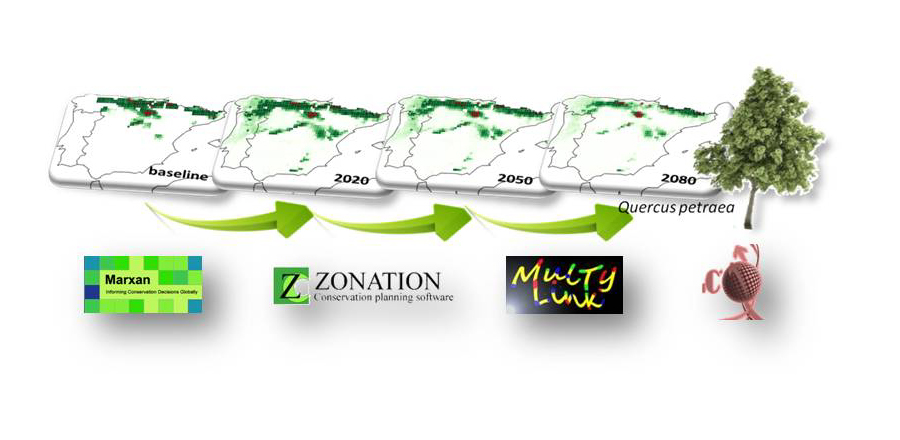 Dispersal corridors for Quercus petraea in Iberian Peninsula from a baseline period to 2080 (red stars) and the species modeled climatic suitability (greens) under an optimised conservation plan. Source: Alagador et al., 2014, J. Applied Ecol, 51:703-713.
Dispersal corridors for Quercus petraea in Iberian Peninsula from a baseline period to 2080 (red stars) and the species modeled climatic suitability (greens) under an optimised conservation plan. Source: Alagador et al., 2014, J. Applied Ecol, 51:703-713.
Spatial conservation prioritisation is a scientifically-driven procedure to identify cost effective networks of conservation areas that maximize the representation of biodiversity. But, cost efficiency and representation of biodiversity is only part of spatial conservation prioritisation. The recognition that nature operates dynamically has stimulated researchers to embrace the additional challenges of developing methods to make standard conservation approaches more dynamic and therefore increase the chances that biodiversity are preserved in the longer term.
The course “Concepts and Methods in Spatial Conservation Prioritization” aims to:
• introduce the fundamental concepts of spatial conservation prioritization;
• present, describe and operate methodological tools currently in use to solve spatial conservation problems (in particular Marxan, Zonation, MulTyLink and a new software at experimental phase iC4);
• discuss a wide range of possible conceptual applications that may be supported with such software machinery, given particular emphasis to studies developed under contexts of dynamic environments (e.g., climate change).
The course is coordinated Dr. Diogo Alagador with contributions by Prof. Miguel B. Araújo and Prof. Jorge O. Cerdeira. The course gives equal weight to theory and practice. The participants will have opportunity to learn how to run distinct software tools, to explore several conceptual avenues, and to put in discussion their own views and ideas about spatial planning giving special emphasis to conservation in dynamic environments.
Although an illustrative dataset will be available to run exercises and demonstrations, participants are invited to bring their own data in order to work on their own case studies. During one day, participants will analyse these data and prepare a small report for discussion in the class.
Dates and logistics
The course will take place in the historical city of Évora, in Portugal, between the 28th of September and the 3rd of October 2015.
Course Objectives
In the end of the course, participants will:
• Have a broad overview of the spatial conservation problems that may be handled quantitatively;
• Understand the conceptual underpinnings of spatial conservation prioritisation problems;
• Understand the strengths, limitations and potential applicability of the proposed free-available software tools (Marxan, Zonation, MulTyLink, iC4: Identifying Conservation Corridors for Climate Change);
• Enhance their operative skills in spatial conservation planning software (in particular the above mentioned), for applications conducted under challenging contexts (e.g., climate change).
For more information please download our course flier.